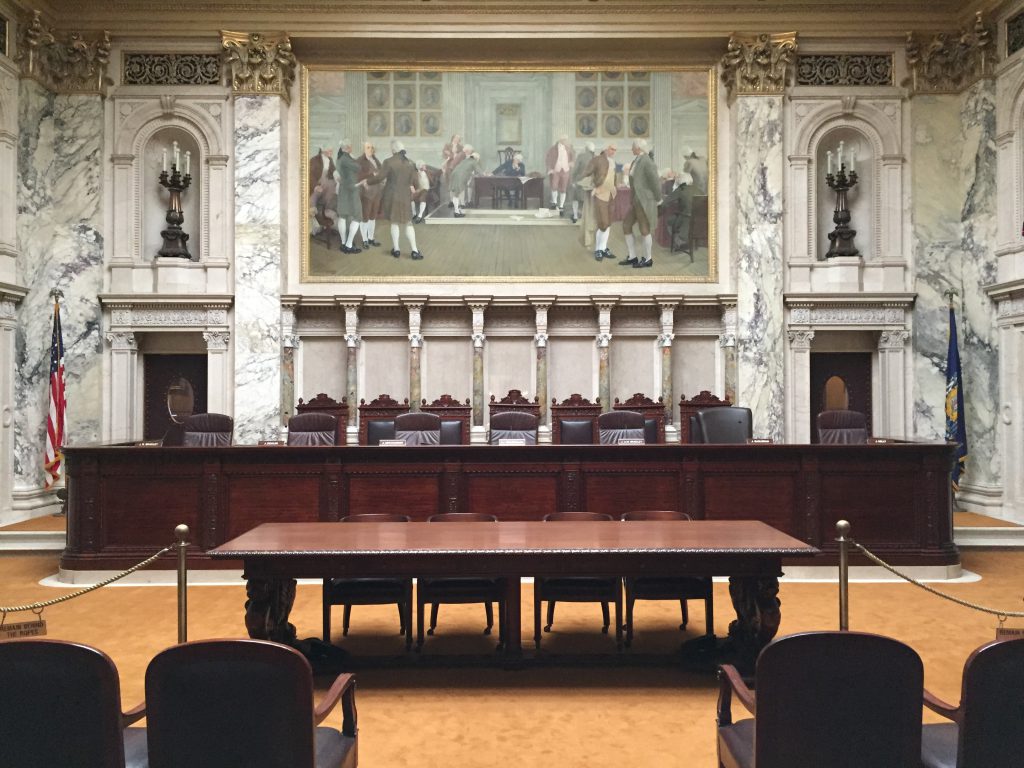State High Court Strips Lower Courts’ Power
Supreme Court ruling quietly constrains circuit courts' power to stop the enforcement of unconstitutional laws.
The Wisconsin Constitution defines the powers of our state courts. It provides that every circuit court has the power to adjudicate “all matters civil and criminal” and “may issue all writs necessary in aid of its jurisdiction.” This is legalese for a simple proposition: our county trial courts are the primary forum to resolve disputes, and the judges in those courts have authority to accomplish justice.
But last spring the Wisconsin Supreme Court undermined this fundamental principle, and it did so in a pair of unheralded, unpublished, and unsigned preliminary procedural orders. Those orders distorted existing law and, shockingly (perhaps even inadvertently), stripped our circuit courts of the power to stop the enforcement of laws that violate constitutional precepts.
The Supreme Court issued these orders in two underlying lawsuits, both challenging the legislature’s overreach in last fall’s lame-duck extraordinary session to seize power from the newly elected governor and attorney general. (Full disclosure: I represented the plaintiffs in one of those suits.) In each case, a circuit court concluded that the legislature’s lame-duck laws violated the Wisconsin Constitution and issued an injunction prohibiting unconstitutional enforcement of those laws. In each case, the legislature appealed the injunction and sought a stay that would prevent the injunction from taking effect during the appeal. And in each case, the Supreme Court granted the legislature’s request.
A careful reading of these recent orders leads inexorably to the understanding that any time a circuit court issues an injunction against an unconstitutional law, that court commits legal error if it declines to immediately put that injunction on hold until the appellate courts can make a decision. In practice, that means circuit courts have no authority to issue injunctions; the power to issue an order that must immediately be rendered ineffective until another court reviews it is no power at all. It is certainly not the power that the Wisconsin Constitution and our statutes expressly confer upon our circuit courts.
Not only did the Supreme Court’s recent orders strip circuit courts of fundamental authority, but they did so under the radar, without public notice. The Supreme Court typically operates after careful consideration through transparent procedures. The Court accepts detailed, researched briefs from all sides of an issue, holds oral argument in a public session, and issues published decisions articulating its reasoning. Here, however, these orders deviated from those norms. The Court gave the parties truncated opportunities to research and file briefs, held no oral argument, and issued unsigned, unpublished orders that provide incomplete and unconvincing explanations of its reasoning. (The orders, previously not publicly accessible, have been made available, here and here, by the Wisconsin Law Review.)
As a general matter, unpublished opinions and preliminary procedural rulings are not precedential—they do not change the law. But that rule does not hold here. These orders make substantial changes to existing law, and the Supreme Court itself—both the majority and the dissenters in these orders—clearly conveyed that it understands these orders to create binding new principles of law. And those principles all point in one direction: circuit courts no longer have authority to use a crucial tool to protect our constitution.
Reprinted with permission of Wisconsin Examiner.
Jeffrey Mandell is a Madison attorney who represented the plaintiffs in League of Women Voters of Wisconsin v. Evers, one of the lawsuits challenging the Legislature’s 2018 lame-duck session, and Madison Teachers, Inc. as amicus in Koschkee v. Taylor, which dealt with the Superintendent of Public Instruction’s independent constitutional authority. The views expressed here are his own and don’t represent those of his firm or clients.
Op-Ed
-
Wisconsin Candidates Decry Money in Politics, Plan to Raise Tons of It
 Dec 15th, 2025 by Ruth Conniff
Dec 15th, 2025 by Ruth Conniff
-
Trump Left Contraceptives to Rot; Women Pay the Price
 Dec 8th, 2025 by Dr. Shefaali Sharma
Dec 8th, 2025 by Dr. Shefaali Sharma
-
Why the Common Council’s Amended Budget is Good Policy for Milwaukee
 Nov 20th, 2025 by Alds. Marina Dimitrijevic and Russell W. Stamper, II
Nov 20th, 2025 by Alds. Marina Dimitrijevic and Russell W. Stamper, II





















